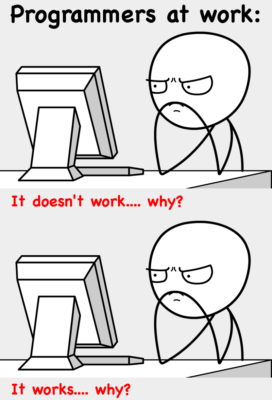It’s the cornerstone of binary math!
Tag: geek
[gallery] Brian Kesinger
Brian Kesinger is a story artist at Walt Disney Animation Studios. He’s also an author and illustrator of Walking Your Octopus. Kesinger masterfully blends the Disney world with the steampunk universe and imagines exciting adventures of a very unlikely friendship. The main characters of these wonderful adventures are Victoria and her per octopus, Otto. “Everyone can relate to having a pet,” Kesinger says. “What I wanted to do with Otto and Victoria is to ask the question ‘What if your pet was an octopus?’ As soon as you do that you start to raise humorous scenarios like how hard would it be to housebreak an octopus when they’re inking everywhere.”
He’s also getting a large following for his novel mash-ups of Star Wars, Dr. Who, Calvin & Hobbes and many others
Trump on Twitter
We all know that Trump is obsessed with Twitter. At last count, he had over 35 million followers. Surprisingly though, he’s only following 45 accounts (I’m barely on Twitter, and I have double that number). Here’s a quick breakdown of who matters in the world of Trump:
Accounts associated with his children: 6
Accounts associated with politics: 10 (3 of which belong to people he subsequently fired)
Accounts associated with news organizations: 12 (11 of which are directly linked to Fox News)
Accounts associated with the Trump brand: 12
So who does that leave:
Piers Morgan – Professional twat
Vince McMahon – CEO of WWE Wrestling
Mark Burnett – Reality TV producer (among others, the Apprentice)
Roma Downey – Wife of Mark Burnett
Gary Player – Pro golfer
God bless America.
How coders become architects
Acidwarped!
This picture was taken a loooong time ago, when the buzz page was still in existence. I don’t know the exact date, but I can say it was taken in the summer between the end of my B.Sc and the start of my M.Sc. This was my profile picture for the chat room for InterFace, the pirate ratio station for the longest of times.
Two schools of coding
That sort of links up with the recent essay on empathy for the coder.
Empathy for the coder
You read through the code. You read it again to make sure you understand what it’s doing. Your left eye starts twitching. You read the code a third time.
“WTF was wrong with the person who wrote this?”
I hate how often I react this way. It’s a quick default that’s hard to reset — immediate annoyance as if the developer or engineer responsible for writing whatever I’ve come across was scattering landmines. It’s easy to shit on the people who came before you. They’re usually not around to defend themselves or provide context. It’s much harder to calm down, and think things through. An initial reaction of “WTF?!” is entirely valid (You’re gonna feel what you’re gonna feel.), but getting stuck on the frustration and not going further is unfair to your predecessors and causes you to miss out on learning.
“How” a problem was solved/band-aided/kicked-down-the-road is usually the root of those frustrations, but the next step is thinking through the “Why” of the solution, which is often the source of useful information.
The code might be stupid, but there’s usually a reason. Maybe:
- Something stupid upstream brought its stupid with it. Alternatively, something stupid downstream needed more stupid.
- The dev/engineer was told to do it that way.
- The dev/engineer was getting pulled in 1000 different directions and needed to make a fast band-aid.
- The dev/engineer was doing the best they knew how.
- It’s actually not stupid. You just think you know more than you do.
That doesn’t rule out laziness or malice, but they’re much rarer and shouldn’t be the default assumption. When we run across goofy looking code and configs, we need to respect the constraints and context the person who wrote them faced. Note: That the person might actually be an idiot is a real, intractable constraint. How would you have fixed that?
Thinking through and learning the “whys” that caused the stupid will help you understand the context of the problem you’re currently facing. You’ll learn about not only technical pitfalls, but cultural ones as well. A lot of the stupid that shows up in code has nothing to do with the technical competence of the person who wrote it and everything to do with their manager or the company at large.
How many times has the past version of you done something stupid that harmed future you? How many times have you looked at something you made a year ago and thought “What was I thinking?” Like any skill, if you’re not embarrassed by some of the code and configs you’ve written in the past you’re 1.) an egotistical monster, and 2.) not getting better. Knowing that, allow some grace for yourself and the people who came before you.
I can’t say I’ve mastered this skill yet. Sometimes, in moments of frustration, I flat out suck at it. But I’m trying and that’s kind of the crux to all this. Everyone is trying, no one has arrived, and the more we empathize with the unknown constraints of those who came before us, the better off we’ll be.
Adapted from original link
The illlusion of competence
One day in 1995, a large, heavy middle-aged man robbed two Pittsburgh banks in broad daylight. He didn’t wear a mask or any sort of disguise. And he smiled at surveillance cameras before walking out of each bank. Later that night, police arrested a surprised McArthur Wheeler. When they showed him the surveillance tapes, Wheeler stared in disbelief. ‘But I wore the juice,’ he mumbled. Apparently, Wheeler thought that rubbing lemon juice on his skin would render him invisible to videotape cameras. After all, lemon juice is used as invisible ink so, as long as he didn’t come near a heat source, he should have been completely invisible.
Police concluded that Wheeler was not crazy or on drugs – just incredibly mistaken.
The saga caught the eye of the psychologist David Dunning at Cornell University, who enlisted his graduate student, Justin Kruger, to see what was going on. They reasoned that, while almost everyone holds favourable views of their abilities in various social and intellectual domains, some people mistakenly assess their abilities as being much higher than they actually are. This ‘illusion of confidence’ is now called the ‘Dunning-Kruger effect’, and describes the cognitive bias to inflate self-assessment.
To investigate this phenomenon in the lab, Dunning and Kruger designed some clever experiments. In one study, they asked undergraduate students a series of questions about grammar, logic and jokes, and then asked each student to estimate his or her score overall, as well as their relative rank compared to the other students. Interestingly, students who scored the lowest in these cognitive tasks always overestimated how well they did – by a lot. Students who scored in the bottom quartile estimated that they had performed better than two-thirds of the other students!
This ‘illusion of confidence’ extends beyond the classroom and permeates everyday life. In a follow-up study, Dunning and Kruger left the lab and went to a gun range, where they quizzed gun hobbyists about gun safety. Similar to their previous findings, those who answered the fewest questions correctly wildly overestimated their knowledge about firearms. Outside of factual knowledge, though, the Dunning-Kruger effect can also be observed in people’s self-assessment of a myriad of other personal abilities. If you watch any talent show on television today, you will see the shock on the faces of contestants who don’t make it past auditions and are rejected by the judges. While it is almost comical to us, these people are genuinely unaware of how much they have been misled by their illusory superiority.
 Sure, it’s typical for people to overestimate their abilities. One study found that 80 per cent of drivers rate themselves as above average – a statistical impossibility. And similar trends have been found when people rate their relative popularity and cognitive abilities. The problem is that when people are incompetent, not only do they reach wrong conclusions and make unfortunate choices but, also, they are robbed of the ability to realise their mistakes. In a semester-long study of college students, good students could better predict their performance on future exams given feedback about their scores and relative percentile. However, the poorest performers showed no recognition, despite clear and repeated feedback that they were doing badly. Instead of being confused, perplexed or thoughtful about their erroneous ways, incompetent people insist that their ways are correct. As Charles Darwin wrote in The Descent of Man (1871): ‘Ignorance more frequently begets confidence than does knowledge.’
Sure, it’s typical for people to overestimate their abilities. One study found that 80 per cent of drivers rate themselves as above average – a statistical impossibility. And similar trends have been found when people rate their relative popularity and cognitive abilities. The problem is that when people are incompetent, not only do they reach wrong conclusions and make unfortunate choices but, also, they are robbed of the ability to realise their mistakes. In a semester-long study of college students, good students could better predict their performance on future exams given feedback about their scores and relative percentile. However, the poorest performers showed no recognition, despite clear and repeated feedback that they were doing badly. Instead of being confused, perplexed or thoughtful about their erroneous ways, incompetent people insist that their ways are correct. As Charles Darwin wrote in The Descent of Man (1871): ‘Ignorance more frequently begets confidence than does knowledge.’
Interestingly, really smart people also fail to accurately self-assess their abilities. As much as D- and F-grade students overestimate their abilities, A-grade students underestimate theirs. In their classic study, Dunning and Kruger found that high-performing students, whose cognitive scores were in the top quartile, underestimated their relative competence. These students presumed that if these cognitive tasks were easy for them, then they must be just as easy or even easier for everyone else. This so-called ‘imposter syndrome’ can be likened to the inverse of the Dunning-Kruger effect, whereby high achievers fail to recognise their talents and think that others are equally competent. The difference is that competent people can and do adjust their self-assessment given appropriate feedback, while incompetent individuals cannot.
And therein lies the key to not ending up like the witless bank robber. Sometimes we try things that lead to favourable outcomes, but other times – like the lemon juice idea – our approaches are imperfect, irrational, inept or just plain stupid. The trick is to not be fooled by illusions of superiority and to learn to accurately reevaluate our competence. After all, as Confucius reportedly said, real knowledge is knowing the extent of one’s ignorance.
Kate Fehlhaber
This article was originally published at Aeon and has been republished under Creative Commons.
Imposter syndrome, or when programming was no longer fun
I loved programming. I loved being able to create something out of nothing. Solving the puzzle of the program and seeing it come to life. Constantly learning new things while hours flew by, and better yet I was paid for it.
I went to one of the best universities in the country for computer science. I cruised into my first job after a successful summer placement. I loved my work and I did well. I moved from a junior position to senior position and was recognized for my hard work and contributions.
Somewhere along the line it stopped being fun. Suddenly I hated going to work. Every day I battled with a growing anxiety that would not go away.
What happened?
– I started comparing myself to other people that were better than me.
– I started to fear doing things wrong and being a failure.
– I started to fear not knowing enough and constantly tried to learn everything.
– I started to feel a crushing weight of responsibility for my job, partner, children, mortgage, and bills
– I started to fear that I would be exposed as a fake.
What I did not realize then is that I was facing a severe case of impostor syndrome.
Instead of enjoying my work I would constantly be worried that I did not know enough, and that I was not doing enough. That I was not providing enough value. I forgot about my accomplishments and emphasized any mistake I made as a complete failure. I started to seek perfection in a world where it’s impossible. Not only did I seek perfection but I expected it of everyone else. It was a recipe for stress and unhappiness.
I remember doing demos of my work in the past. I was confident and happy to do them in front of a number of people. Suddenly I dreaded them. I would become so nervous my voice would tremble as I tried to talk. My thinking was clouded by the dread of saying something stupid, and what others would think of me.
The crushing anxiety was preventing me from enjoying my work and doing well. It was taking its toll on my health. I would feel drained of energy and not sleep well. It was putting strain on my family and relationships. It felt like a ticking time bomb.
It has been stated that up to 70% of people experience impostor syndrome. The trouble is you feel like you’re the only one, as you’re not aware of anyone else going through it. There is a good chance that one of your co-workers is experiencing it right now, but it may not be obvious that something is wrong. It can manifest itself in different ways, and people are good at covering things up especially in a professional environment.
Some points for anyone experiencing it
– Recognize what you do know. It’s more than you think.
– Recognize what you have accomplished. You earned it.
– Take a compliment when you get one. You deserve it.
– Compare yourself only to yourself.
– Realize that nobody really knows what they are doing. Everyone is on a learning journey.
– It’s OK to not know everything. Software development is too vast and moves too quickly to know everything. Usually you know just as much as others but in different areas.
– Teach others, it will help you realise how much you do know.
– It’s OK to fail. In fact it’s a necessary and important part of life. Learn from it.
– It’s OK to be wrong. Be open to feedback.
– You will forget things over time. Go back over things you have not used recently.
– There will be egos in the workplace that talk down others. Ignore them.
– Not everything you produce needs to be perfect. Software development is (as is life) about incremental improvements. You are not that piece of code that you put together in a few hours and needs improving.
– Assume that everyone else has impostor syndrome. Tell someone when they have done something good. Tell them what they are good at. Tell them it’s OK if something goes wrong they did a great job. A small comment can go a long way. Having a team of people doing this for each other will foster a healthy environment. We are all human beings and everyone has fears and doubts. Everyone has problems and hardships they are facing outside of work. This idea often gets lost in the veil of professionalism, and we become ever more disconnected. Once we realize and appreciate this we can move towards a more personal and connected workplace.
I am not sure that the feeling of impostor syndrome will ever completely go away. Though it has faded since understanding and recognizing it. Knowing that many others experience it, and that it’s quite normal also helps. I am happy to say that I am getting back to a place where programming is fun.
Understand that it can hit you at any time. It may be when you’re just getting started in programming, or it may be when you have been doing it for 10 years. It may be when you have a newborn baby at home. It may be when you get made redundant and flunk an interview.
What is most important is an awareness of it. Take it seriously. When it does come knocking you can recognize it and work on it instead of letting it consume you. Connect with people and help them to prevent feeling like an impostor. Hopefully you will get the same in return. Lets work to ensure that programming is always enjoyable.
Original link: dev.to()





























































